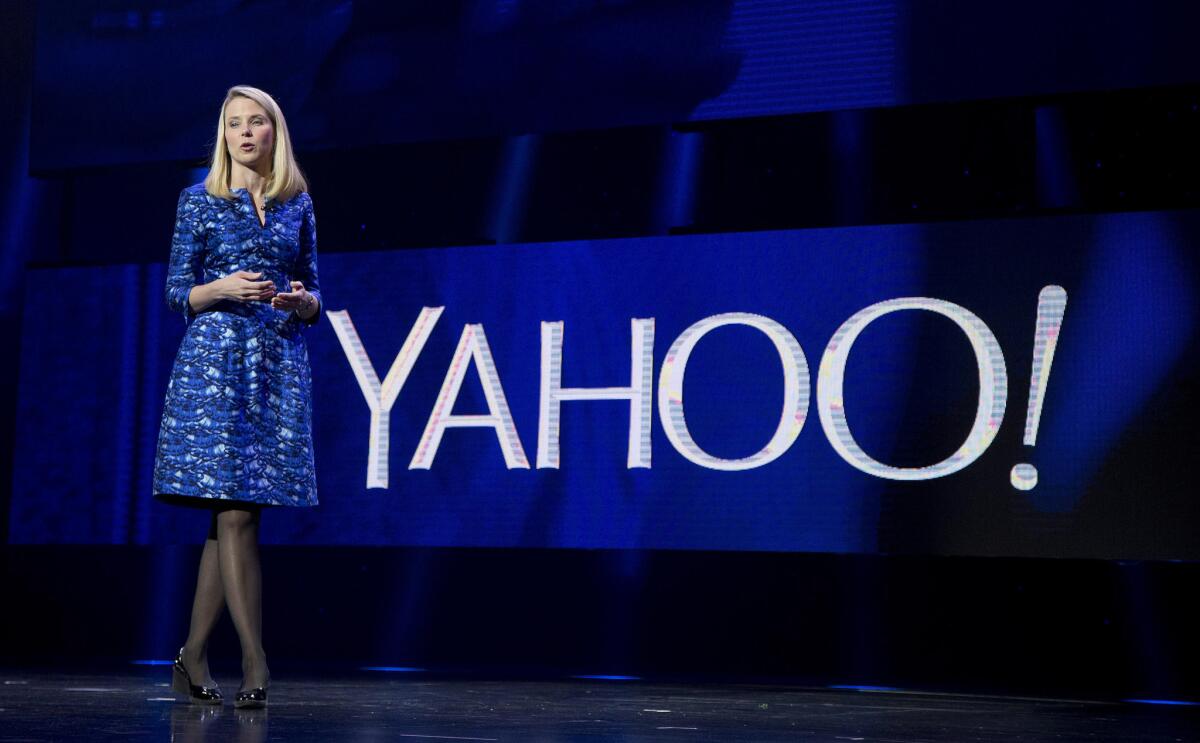Column: Yahoo’s Marissa Mayer utters the six scariest words about Silicon Valley

Yahoo Chief Executive Marissa Mayer in 2014
- Share via
This week’s Fortune Global Forum in San Francisco has brought together some of high-tech’s most glittery stars -- Google’s (excuse us, “Alphabet’s”) Larry Page, Facebook’s Sheryl Sandberg, even Theranos’ beleaguered Elizabeth Holmes--to give their views on the future of their industries and their companies.
But it was Yahoo’s chief executive, Marissa Mayer, who made us sit up and take notice by voicing the six scariest, and most dangerous, words about Silicon Valley today. As reported by USA Today, she said, in reference to the current business and investment climate:
“It’s a lot different from 1999.”
SIGN UP for the free California Inc. business newsletter >>
Her allusion, of course, is to that heady period just before the great dot-com bust of 2000. It’s worth recalling that technology executives and investors were saying pretty much the same thing in 1999. That was the heart of the awe-inspiring runup in tech stocks that brought the Nasdaq index from the 1,500 region at the beginning of 1998 to a peak of 5,048 in March 2000, only to fall back to 1,114 by October 2002.
Countries, institutions, and financial instruments may change over time, but human nature does not.
— Economists Kenneth Rogoff and Carmen Reinhart
Sound familiar? Since bottoming out at a hair over 1,300 in November 2008, the Nasdaq has risen to over 5,100, finally bettering its 2000 mark in April.
The claim that “this time is different” has a long and discreditable history in the financial markets, as was documented by the economists Ken Rogoff and Carmen Reinhart in their 2011 book of the same name, examining financial crises over eight centuries. Every generation forgets the bitter lessons learned by their forebears and repeats the same mistakes, they write, and in the fast-moving modern world lessons can be suffered and forgotten in the span of a decade or two.
“Countries, institutions, and financial instruments may change over time,” they observe, “but human nature does not.”
Mayer’s argument is that the companies underlying the last tech boom in 1999 were built on sand, unlike now. “Today’s companies have real businesses,” she said.
Of course, that’s what people were saying back then, too, when Mayer’s own company, Yahoo, was in its prime (peaking at nearly $119 per share in 2000). More recently, Yahoo has struggled to regain its footing -- as we write, it’s trading at $34.30 -- amid questions about what its core business really is.
The point is not whether any of the technology “unicorns” valued at $1 billion or more in the private venture market today have real businesses, or even whether those that do can succeed in the real-world marketplace. It’s whether investors have bid up their values to unsustainable levels, and whether the apparent euphoria in private valuations is slopping over into the public market tracked by the Nasdaq.
We’ve questioned the basis for the $70-billion valuation of the transportation company Uber, and noted that Theranos racked up a $9-billion valuation without even making data validating its supposed breakthrough in blood-testing technology public. (The technology since has been questioned by the Food and Drug Administration and the Wall Street Journal.)
Many in Silicon Valley, including venture investors Michael Moritz and Bill Gurley, are worried that the current boom is due for a deflation. Unlike Mayer, Moritz recently opined that many unicorns are built on “the flimsiest of edifices.” But others contend that the boom has a long way to run yet. Venture investor Marc Andreesson told the Fortune forum that technology is still undervalued -- “We’re not in a bubble, we’re in a bust,” he said.
He could be right, and so could Mayer. Or they could be wrong. The question is, how much do you want to bet?
Keep up to date with the Economy Hub. Follow @hiltzikm on Twitter, see our Facebook page, or email [email protected].
MORE ON SILICON VALLEY:
Oracle to build high school on its Silicon Valley campus
U.S. patent office finally sets up shop in idea-rich Silicon Valley
Forbes deleted a white tech writer’s article that called Silicon Valley a ‘meritocracy’
More to Read
Inside the business of entertainment
The Wide Shot brings you news, analysis and insights on everything from streaming wars to production — and what it all means for the future.
You may occasionally receive promotional content from the Los Angeles Times.











